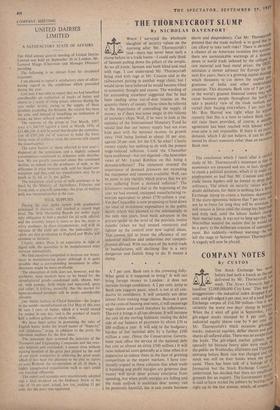THE THORNEYCROFT SLUMP
By NICHOLAS DAVENPORT WHEN I surveyed the wholesale slaughter of security values on the morning after Mr. Thorneycroft's raid—there has never been such a slump before in a trade boom—I could only think of Samson pulling down the pillarS of the temple. As we all know, Samson was both blind and mad with rage. I can understand Mr. Thorneycroft being mad with rage at Mr. Cousins and at the railwaymen putting in another wage claim, but I would never have believed he would become blind to economic thought and reason. The wording of his astounding statement suggested that he had been reading some out-of-date treatise on the quantity thory of money. Three times he referred to the importance of controlling the supply of money, as if there was some magic in the volume. of monetary chips. Well, if he were to look at the statistics of the International Monetary Fund he would find that our money supply had not even kept pace with the national income, its growth since 1948 being limited to about 10 per cent. against 20 per cent. for the US. So what? Clearly money supply has nothing to do with the present wage-induced inflation. Could the Chancellor have swallowed—but not digested—the heterodox views of Mr. Lionel Robbins on this being a demand.inflation? The statement stressed the importance of demand pressures not exceeding the manpower and resources available. Well, can he point to any statistic which proves that we are now suffering from a demand inflation? The Economi.st estimated that at the beginning of the year we had unused, untapped manufacturing re- sources equivalent to about £750 million a year. Yet the Chancellor is now proposing to hold down the total of investment expenditure in the public sector, which was planned to rise-substantially in the next two years, limit bank advances in the private sector to the level of the previous twelve months (when we had unused resources) and tighten up the control over new capital issues. This cannot fail to lower the efficiency of our industrial machine and undermine our competi- tiveness abroad. With our,share of the world trade in ' Manufactures, still declining this is a very dangerous and foolish thing to do: It means a slump.
A 7 per cent. Bank rate is the crowning folly. What good is it supposed to bring? It will not bring foreign money to London : it does not increase foreign confidence. A 2 per cent. jump in Bank rate suggests panic, which is not at all con- ducive to confidence. It will certainly not deter labour from making wage claims. Because it puts up the costs of housing and rents, it will encourage wage claims and could therefore be inflationary. The evil it brings is all too obvious. It will increase the cost of the sterling balances, raising the debit side of our balance of payments by about £50 to £80 million a year. It will add to the budgetary burden of our national debt by a further £100 million a year. (Since the Conservative Govern- ment took office the service of the national debt has cost us almost an extra £500 million.) It will raise industrial costs generally at a time when it is imperative to reduce them in the face of growing competition in the export markets. I have con- tinually argued in these columns that when trade is booming and profit margins are generous dear money will never deter private enterprise from spending, but when profit margins are falling and the trade outlook is uncertain 'dear money can be positively harmful, for it can create business alarm and despondency. Cart Mr. Thorneycroft pretend that the trade outlook is so good that he can afford to take such risks? There is obviously a chance of an American recession this autumn:there are unmistakable warnings of a slowi! down in world trade induced by the collapse inraw material and base metal prices; the OEEf," estimates a slower advance for Europe for tilt' next five years; there is a growing capital shortage which threatens• to cut down the capital pro ,- grammes of India and other undeveloped countries. This dramatic Bank rate of 7 per eeriAti in the world's greatest financial centre may w`' cause business people throughout the world ,„ take a panicky view of the trade outlook and curtail their buying everywhere. I am sure that Mr. Roy Harrod was right when he argued recently that this is a time to reduce Bank rate'‘' not raise them provided, of course, a sensi. agreement has been reached with labour wIlier.` even now is not impossible. If there is an exe.e" demand, which I do not believe, it can be elim inated by direct measures other than an excessne Bank rate.
* . * The conclusion which I reach after a careful study of Mr. Thorneycroft's statement is that its, economics are unsound and are, in fact, desigive to cloak a political purpose, which is to make 'in employment so bad that Mr. Cousins and , trade union leaders will be forced to drop their militancy. The' attack on security values was 'l', doubt deliberate, for there is nothing Exchange slump to create a business depressiq; If the more.optimistic believe that 7 per cent. wt not be in force for long they will be mistaken. will remain in force until the slump has been well and truly laid, until the labour leaders change their martial tune. It was not so long ago that Mr: Macmillan assured the nation that he would 11°` be a party to the deliberate creation of unen1P10.; ment. But suddenly—without warning--he 11,31. left the stage to Samson Agonistes Thorneyercil
A tragedy will now be played. like a Stov.
































 Previous page
Previous page